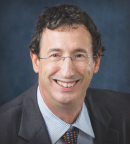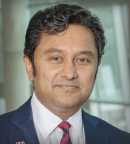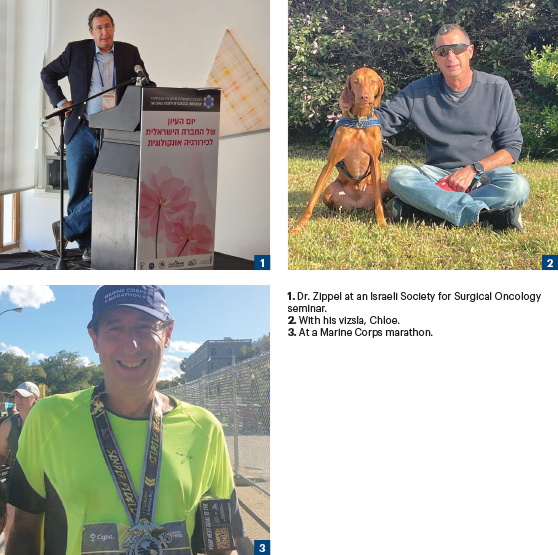In this installment of The ASCO Post’s Global Oncology series, Guest Editor Chandrakanth Are, MBBS, MBA, FRCS, FACS, spoke with Dov Zippel, MD, a surgical oncologist at Sheba Medical Center in Tel Hashomer, Israel, where he is Head of the Meirav Breast Center. Dr. Zippel is the current President of the Israeli Society for Surgical Oncology (ISSO).
Please tell readers a bit about your personal background.
I was born in New York City, where I spent most of my childhood and adolescence. I’m one of those kids who always wanted to go into medicine—from my earliest memories of, maybe, age 4 or 5—and I’m not really sure I understand why. It’s not that I had any immediate family relatives in medicine, but that was just always my direction.
When I graduated high school, I was on a mission to get into medical school, and I entered the University of Pennsylvania as an undergraduate premed student. At that time, I was still trying to figure things out with my life, so I took time off from Penn and ended up coming to Israel. Life has a way of taking you in unforeseen directions, and I ended up staying here. But I continued on my original journey, applied to medical school in Israel, and was accepted to Tel Aviv University.

Cancer incidence in Israel—like in the United States and Western Europe—is higher than in the neighboring Arab countries. I presume there’s a genetic aspect to that.— Dov Zippel, MD
Tweet this quote
I spent some time living in Jerusalem, and then I moved to a suburb of Tel Aviv. I’ve always lived in the central part of Israel. The country is not very big, but it’s very varied. Currently, both the institution where I work and where I live are in what I would call the Tel Aviv metropolitan area. Most of my medical training has been here, although my New York upbringing is still pretty deeply rooted inside me. Whenever I’m in New York, I feel like I’m home.
That’s the short version of my story. I have a family, I’m living in Israel, I practice surgical oncology here, and my life is here.
Career Path
Please shed light on your professional road to oncology.
I’ll actually touch on something quite personal because it’s connected to my professional training. My father died of lung cancer when I was a young man. He knew I was planning to go into medicine, and we had several talks in his last weeks and months of life, and he always said: “When you finish medical school, you have to treat cancer patients. You have to alleviate the suffering that I’m going through now.” That sort of stuck in my head and never left me.
I went to medical school at Tel Aviv University and did my clinical clerkships at Sheba Medical Center. I was pretty sure about going into surgery. It was what excited me. I liked the intimacy and immediacy of surgery, but I also knew that, somehow, I had to connect it with this drive to fulfill my father’s wishes that I be involved in cancer care.
I gravitated to a residency program in a department that is very surgical oncology oriented. This was back in the 90s, and I was in a department where most residents in general surgery were spending their first 1 or 2 years of residency doing gallbladder and hernia procedures. I spent the first few years of my residency scrubbed on HIPEC (hyperthermic intraperitoneal chemotherapy) procedures, even before they were known by the acronym “HIPEC.” My department head was very geared toward surgical oncology, and it captivated me, so it was pretty clear that’s where I wanted to go.
I did an SSO (Society of Surgical Oncology) accredited fellowship in surgical oncology in Calgary, Canada, which was an amazing experience. I got a tremendous amount of professional experience, and it was just an amazing time. After that fellowship, I came back to Israel and proceeded with the rest of my professional career as a surgical oncologist.
GUEST EDITOR

Chandrakanth Are, MBBS, MBA, FRCS, FACS
Cancer in Israel
Can you tell us about the cancer landscape in Israel?
Cancer incidence in Israel—like in the United States and Western Europe—is higher than in the neighboring Arab countries. I presume there’s a genetic aspect to that. One important factor in Israel is BRCA carrier mutation status. In my particular institution, Sheba Medical Center, we have a high-risk BRCA carrier clinic, which caters to both males and females, for screening, education, and so forth. In our female breast and ovarian cancer screening clinic, we have about 1,000 patients, and that’s just a drop in the bucket because the Israeli population is 8 million. We assume there are approximately 30,000 to 40,000 BRCA mutation carriers in the country, most of whom probably don’t know they are carriers.
Classically, we talk about the Ashkenazi Jewish community, which is where BRCA is largely found, but it’s also frequently seen in Iraqi Jews. We have a disproportionate number of high-risk individuals, which I think makes that etiology a greater focus in Israel than in other Western countries.
Besides the high BRCA incidence, are there other factors in the Israeli cancer demography that are different from surrounding countries?
I’ve looked at a number of studies on this issue, and there is no clear-cut answer. Most of our neighbors are Arab countries, and we also have a significant Israeli Arab population living as a minority within Israel itself. And there’s no question there is a difference in cancer incidence between the Jewish population and the non-Jewish population. Again, I imagine that it’s mostly genetic issues, not necessarily environmental issues, because we’re all more or less subject to the same environment.
The geopolitical situation here is very complex, and as a medical professional, I’m not going to discuss the politics. But socioeconomic factors are a considerable factor in public health. Israel is a startup nation, and the high-tech industry has made us prosperous, so I guess that’s had an impact on cancer outcomes, as well as on our ability to give medical care, although I think our government expenditure in that area is not as high as it should be.
Cancer Care Challenges and Evolution
What other issues or challenges do you see for Israel’s cancer care system.
I mentioned before that Israel is a small geographic country, but we do have disparities between people who live in the periphery and people who live in the center of the country. Although you would think it’s easy for people to travel—it’s only a couple of hours drive from here to the north or from here to the south—the bottom line is these disparities exist, and that’s something I think has to be solved on a national level.
Organizations like the ISSO, the Israel Cancer Association, and the Israel Medical Association can certainly be involved in that. This is something that is not particular to Israel; it’s pretty common around the world to have disparities between peripheral areas with lower socioeconomic brackets and the larger central metropolitan areas, where there’s more investment. Nevertheless, we should have a more fair allocation of resources.
Please give us a sense of how cancer care in Israel has changed over the course of your career.
I think about the things I learned in medical school and what our students are seeing now. It’s a completely different world. For example, one of my fields of interests is melanoma, which basically brought on the whole immuno-oncology revolution into cancer care. Everything has changed—the technology, the imaging systems, our ability to screen. It’s a different world, and I think we are making an impact.

I don’t know where we’ll be 30 years from now. I certainly hope these increments of our ability to care for patients continue to increase. But over the arc of my career, I’ve seen cancer care completely change. The change has come so quickly; it feels like it happened overnight. It is truly an exciting time to be in the field of oncology.
Current Research
Please share some of your current research interests.
My work is mostly clinical research; I don’t have a lab. My institution has a large and well-staffed melanoma unit. It’s like a melanoma clearinghouse for the whole country. By way of reference, I think my most cited publication was on the subject of adoptive cell therapy for melanoma, even before the advent of checkpoint inhibitors as standard immunotherapy for melanoma. Just when immuno-oncology was coming into the fore, we were the first institution outside the National Cancer Institute to clinically apply adoptive cell therapy to metastatic melanoma. I was fresh from my fellowship, very eager, and the melanoma unit needed a dedicated surgeon because the patients receiving adoptive cell therapy required tissue harvesting. We took cancer tissue from whatever site was available, whether it was lymphadenectomies, abdominal surgery, adrenalectomies, cholecystectomies; I did all of that for metastatic melanoma.
One of my more recent publications has been on stage IV melanoma abdominal surgery. You would think from an intuitive point of view that as our systemic treatments get so much more effective that we’d need much less surgery. But it is sort of paradoxical that the improvement in systemic treatment has actually increased our indications for surgery in melanoma. Specifically, you might have a patient with several metastatic sites that are responsive, as well as a nonresponsive site—this is a patient for whom surgery is part of the overall treatment package, which I find fascinating because it’s so counterintuitive.
Another area that I do a lot of work in is breast cancer. Just last week, we had a paper published reporting work done by an American student who was working with us for a while on patients with a diagnosis—either synchronous or metachronous—of both melanoma and breast cancer. We were trying to see whether there was any genetic disposition there, or if just having surveillance for one malignancy makes it more likely we will catch other malignancies. That’s basically what I’ve been working on for a number of years: melanoma and breast cancer in the clinical setting.
Israeli Society of Surgical Oncology
Could you please tell us a bit about your position as President of the Israeli Society of Surgical Oncology?
The ISSO has been around for about 30 years. It was founded in 1992 by a group of surgeons who were all members of the SSO. We used the SSO as a model and sort of transplanted it into our health system. It was one of the first subspecialty organizations under the umbrella of the Israeli Surgical Association, and it basically blossomed from there because there was no one else was doing anything similar.
However, lately things have begun to splinter. There’s been a gravitation to more organ-specific societies, and the surgical oncology societies, being more expansive and inclusive, are losing a little traction against these organ-based societies. I’m a strong believer that surgical oncology is an important concept, and it’s not focused on any single organ. Surgical proficiency is obviously important in every realm. If you go into hepatobiliary surgery or colorectal surgery, that’s all based on surgical proficiency, but it’s important that surgeons are trained to think as oncologists. And that’s lacking in some of the organ-based societies.
I really think we have to educate our next generation of surgeons about the importance of seeing surgical oncology as something that is not limited in any way or form to a specific part of the body. It basically calls for an oncologist who knows how to operate. And that’s what I see as my vision for the ISSO, to transfer that vision to the next generation.
I was elected President of the ISSO after our election in May 2022. It’s been a year that I’ve held the reins. I succeeded our colleague, Dr. Aviram Nissan, and just sunk my head right into it. I have sort of two roles—a domestic role and a foreign relations role.
I’m a strong believer that surgical oncology is an important concept, and it’s not focused on any single organ. Surgical proficiency is obviously important in every realm.— Dov Zippel, MD
Tweet this quote
My domestic role is to organize educational events, seminars, sessions in domestic medical conferences, and getting the message about surgical oncology to the next generation of Israeli surgeons. At the same time, the foreign relations part of my job builds on the bilateral relations with various surgical oncology societies around the world. Currently, we’re a sister society with the SSO and with ESSO (European Society of Surgical Oncology), and I’ve recently reached out to other surgical oncology societies such as the Brazilian Society of Surgical Oncology. Some of this has also been through our work together in the Global Forum of Cancer Surgeons, led by Dr. Chandra Are, because these are people I’ve been meeting on a regular basis.
I’m looking forward to planning a surgical oncology summit in the beginning of 2024, for which we’ve reached out to surgical oncology and organ-based societies around the world. We hope to host a meeting here in Israel, in Jerusalem. That’s been occupying a lot of my time.
Impact of the Pandemic
How has COVID-19 affected your hospital’s ability to provide cancer care?
Israel got a lot of press about how we handled our COVID-19 vaccine rollout. When I look back on it, I think overall, I would give the ministry of health very good marks on how we handled the crisis. On a personal level, I did not have to cancel any oncology cases at the height of the pandemic, when people were terrified to go out on the street. It was actually easier for me to get OR time booked during the pandemic simply because a lot of general elective surgery just stopped, froze in its tracks. We had available staff and operating rooms, so we really managed to navigate the pandemic and continue our cancer surgery.
However, there’s a caveat here. I think we are now feeling the effect of something like an aftershock after an earthquake. Our screening rates declined during the height of the pandemic and over the course of 1 or 2 years. People were frightened to come to the hospital, which I can certainly understand. But because of that, the amount of screening mammograms and screening colonoscopies went down. And I think now we’re beginning to see the delayed effect of that in more advanced cancers at diagnosis. We’re seeing more colon cancers being diagnosed as obstructions or other emergent situations. We need to take that lesson seriously before the next pandemic, God forbid. Cancer screening cannot be avoided. No matter what, we need to find creative ways to maintain our early detection programs.
It was a completely new challenge we were dealing with in real time as things were changing daily. But it’s a simple clinical fact: If you lower your screening levels, you’re going to have a higher cancer burden a few years down the road, and that’s what I think we’re experiencing now. Still, I think we did a good job at Sheba Medical Center.
Closing Thoughts
Any final thoughts for readers of The ASCO Post?
I think one of the most important things in my career development was always having a mentor. All through my training, I had someone above me who I could emulate. And I don’t mean how to suture an anastomosis or how to do this particular procedure or technique, but someone I could look to as a role model for what I imagined a surgical oncologist should be.
If I have to say anything to young residents considering this type of career, it’s to find yourself someone you admire as a doctor to shadow. It will have benefits that will last throughout your career. Mentoring is an invaluable part of how the oncology community develops its next generation of surgical oncologists.
DISCLOSURE: Dr. Zippel reported no conflicts of interest.

